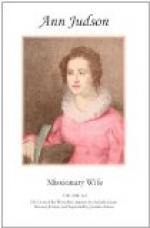yet obedience to our Lord, and compassion for the
perishing heathen, induced us to make this sacrifice.
And have we ever repented that we came?
No; I trust we can both say that we bless God
for bringing us to Burmah, for directing our footsteps
to Tavoy, and even for leading us hither.
You already know, my love,’ he continued,
with a look of tenderness never to be forgotten, ’that
I cannot live long, I must sink under this disease;
and should we go home now, the all-important
business which brought us out, must be given
up, and I might linger out a few days of suffering,
stung with the reflection, that I had preferred a few
idle days, to my Master’s service.
Do not, therefore, ask me to go, till these poor
Karens have been baptized.’ I saw he was
right, but my feelings revolted. Nothing
seemed so valuable as his life, and I felt that
I could make any sacrifice to prolong it, though it
were but for one hour. Still a desire to
gratify him, if no higher motive made me silent,
though my heart ached to see him so ill in such
a wretched place, deprived of many of the comforts
of life, to say nothing of the indulgences desirable
in sickness.
“The chapel was large, but open on all sides, excepting a small place built up for Mr. Mason, and a room about five feet wide and ten feet long, for the accommodation of Mr. Boardman and myself with our little boy. The roof was so low, that I could not stand upright; and it was but poorly enclosed, so that he was exposed to the burning rays of the sun by day, and to the cold winds and damp fog by night. But his mind was happy, and he would often say, ’If I live to see this one ingathering, I may well exclaim, with happy Simeon, Lord, now lettest thou thy servant depart in peace, according to thy word, for mine eyes have seen thy salvation. How many ministers have wished they might die in their pulpits; and would not dying in a spot like this, be even more blessed than dying in a pulpit at home? I feel that it would.’
“Nor was it merely the pleasing state of things around him that filled his mind with comfort. He would sometimes dwell on the infinite compassion of God, and his own unworthiness, till his strength was quite exhausted; and though he told Mr. Mason that he had not the rapture which he had sometimes enjoyed, yet his mind was calm and peaceful; and it was plainly perceptible, that earthly passions had died way, and that he was enjoying sweet foretastes of that rest into which he was so soon to enter. He would often say to me, ’My meditations are very sweet, though my mind seems as much weakened as my body. I have not had that liveliness of feeling, which I have sometimes enjoyed, owing to my great weakness, but I shall soon be released from shackles, and be where I can praise God continually, without weariness. My thoughts delight to dwell on these words, There is no night there.’
“I felt that the time of separation




